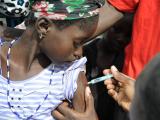A study of nearly 1.7 million children younger than 6 years in Italy estimates that the 4-component protein-based (4CMenB) vaccine is over 90% effective against serogroup B invasive meningococcal disease (IMD).
A team led by researchers at the University of Florence analyzed data from regional surveillance efforts and vaccination registries on the effectiveness of 4CMenB among an observational screening cohort of 587,561 children younger than 6 years in three regions of the country and a separate cohort of 1,080,620 matched case-controls in six regions before and after vaccine availability (2006 to 2020).
In the case-control analysis, the team evaluated the association between serogroup B IMD and the exposure to at least one dose of the 4CMenB vaccine. A second analysis included only children old enough to receive at least the first dose of the vaccine, and a third analysis included all children too young to be fully vaccinated. They also assessed the VE in partially vaccinated children and in those who had received only one dose.
The vaccine was implemented in Italy's National Immunization Program in 2017 as a four-dose schedule starting at 2 months of age. The research was published late last week in JAMA Network Open.
Confirmatory population-based VE data
IMD is a rare but serious bacterial infection caused by Neisseria meningitidis that affects mainly infants and young children. In the past 10 years, serogroup B meningococci has been the primary cause of IMD in North America and Europe and is prevalent in Latin America. The highest incidence of serogroup B IMD is in the first year of life, peaking between ages 4 and 8 months.
"Since IMD is a rare disease, the 4CMenB vaccine was authorized [in 2013 in Europe] on the basis of safety and immunogenicity studies that used the immunogenicity results as proxy for vaccine effectiveness (VE)," the study authors wrote.
"In this situation, population-based confirmatory data regarding the effectiveness and reduction in incidence rate ratios (IRRs), as a proxy for vaccine impact, of 4CMenB vaccination are continuously needed."
Up to 96% protection in fully vaccinated kids
A total of 103 cases of serogroup B IMD were recorded in the three screening regions. The VE of 4CMenB in fully immunized children was 94.9% (95% confidence interval [CI], 83.1% to 98.4%) using the screening method and 91.7% (95% CI, 24.4% to 98.6%) using the case-control method. The decrease in the IRR was 50%, reaching 70% in regions with early-start vaccination schedules.
The high proportion of children too young to be vaccinated among unvaccinated cases suggests that starting the vaccination even earlier may prevent more cases.
The case-control analysis, which included 26 infected and 52 uninfected children, found an estimated VE of 92.4% (95% CI, 67.6% to 97.9%) in children old enough for the first dose and 95.6% (95% CI, 71.7% to 99.1%) in fully immunized children. VE was 91.4% among partially immunized children and 100% among those who had received only one dose, since no serogroup B IMD cases were identified in that group.
Even in regions in which the first dose was given at 2 months of age, nearly 20% of infections occurred in infants too young to receive the first dose.
"The high proportion of children too young to be vaccinated among unvaccinated cases suggests that starting the vaccination even earlier may prevent more cases," the study authors wrote. "Screening and case-control methods provided similar estimates of VE: either method may be used in different study settings, but concomitant use can provide more robust estimates."



















